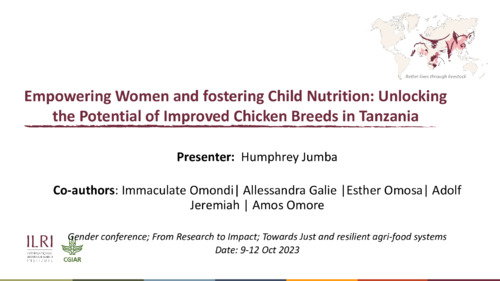Empowering women and fostering child nutrition: Unlocking the potential of improved chicken breeds in Tanzania
Abstract
Improved chicken breeds have potential to enhance incomes and improve household nutrition among smallholder poultry farmers. However, there is limited evidence on whether (and how) this livestock intervention can support women’s empowerment and improve child nutrition. This study explored the impact of the Women-in-Business (WiB) project, implemented by the International Livestock Research Institute in collaboration with other stakeholders in Tanzania’s Kilimanjaro and Lindi regions from 2019 to 2022. The WiB aimed to empower women and improve child nutrition by providing increased access to improved chicken breeds, and also used social-media messaging to challenge gender norms that impede women’s involvement in the poultry value chain. This study focused on two research questions: i) What is the relationship between access to improved chicken breeds, women’s empowerment, and child nutrition? ii) How does addressing negative gender norms impact women’s empowerment? Using a mixed-methods approach, we analyzed women-empowerment and child-nutrition data from repeat (baseline and endline) cross-sectional surveys of 192 households, and eight sex-separated focus group discussions with chicken farmers. According to quantitative results, access to improved chicken breeds and challenging harmful gender norms substantially increased the number of women achieving empowerment, and positively impacted child nutrition. Qualitative data supported the quantitative results, indicating that the availability of nutrient-rich eggs and chicken meat contributed to improved household dietary diversity and overall child nutrition. Our findings inform policy and strategic actions for gender-responsive and transformative agri-food systems, emphasizing innovations around improved chicken breeds.

